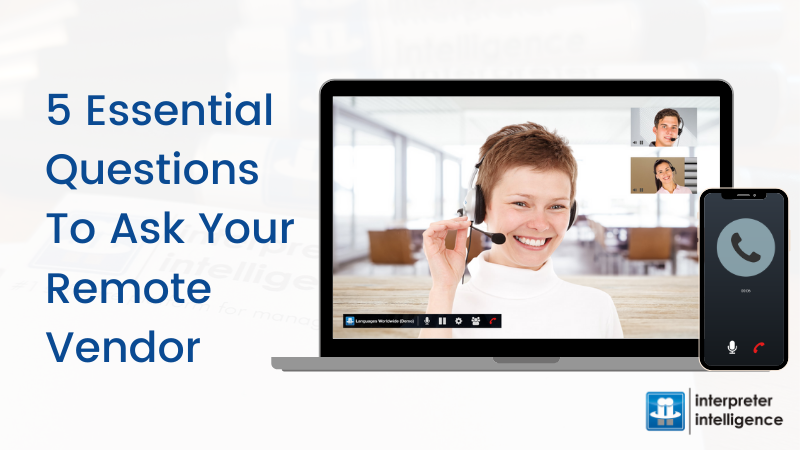COVID-19 is forcing language service providers to exclusively offer remote interpreting services. To do that, providers need the right platform. Many LSPs have been using ad-hoc video solutions, such as Zoom, but those platforms are not designed for remote interpreting services. Here are 5 essential questions you need to ask your remote technology provider if you want to offer high-quality remote interpreting services.
1) Is there a limit to the amount of participants that can join the session?
As we all know, there are at least 3 participants in any interpreting session, and most platforms can support up to 3 participants. However, it is very common for more than 3 participants to join a video or voice call, so make sure your remote interpreting vendor can support a video or voice call with more than 3 participants. A good remote interpreting platform can provide high-quality video and audio for about a dozen participants.
2) Can participants join the call in different ways?
Some participants join on their laptops, some join on their tablet, some join on their phone, some dial in the old-fashioned way. Make sure your remote technology provider has support for a session where participants can join in different ways, through different communication channels.
3) Does the platform integrate with third party video services?
If your customer does insist on using a third party video service, it is always a nice bonus if your remote interpreting platform can integrate with that third party video service. Many hospitals have been using ad-hoc solutions such as Zoom, so it’s always a plus if your remote interpreting platform integrates with other video platforms.
4) Does the platform have support for RSI?
Most remote interpreting sessions are consecutive. However, for long sessions with many participants, remote simultaneous interpreting (RSI) is the preferred interpreting mode. Make sure your remote technology provider can offer a video service where participants can mute the right channels so they can only hear the interpreter when they need to.
5) Is the platform HIPAA compliant?
Video platforms such as Zoom are not HIPAA compliant. Make sure your remote technology provider offers a video solution that complies with HIPAA. To protect the privacy of your customers, video sessions and voice calls require end-to-end encryption, and the sessions cannot be processed or stored.
Interpreter Intelligence Can Help!
If you want a remote interpreting platform that checks these 5 boxes, then you’re at the right address. Our VRI & OPI features have no recorded participant limit, participants can join in whichever way they like, we integrate with third party video services if need be, we have support for RSI, and we have always been fully HIPAA compliant. Get in touch to schedule a demo of our remote interpretation features.


I’m gone to say to my little brother, that he should also go to see this website on regular basis to obtain updated from most recent reports.
Hi, i think that i saw you visited my blog thus i came to “return the favor”.I am attempting
to find things to enhance my site!I suppose its ok to use some of your ideas!!
Oh my goodness! Awesome article dude! Thank you so much, However I
am experiencing issues with your RSS. I don’t know the reason why I can’t join it.
Is there anybody having the same RSS issues? Anybody who knows the answer will you kindly respond?
Thanks!!
Does your site have a contact page? I’m having trouble
locating it but, I’d like to send you an e-mail. I’ve
got some suggestions for your blog you might be interested in hearing.
Either way, great site and I look forward to seeing it expand over time.
Wow, superb blog format! How lengthy have you ever
been running a blog for? you made blogging glance easy.
The total look of your site is magnificent, as well as the content
material!
Hi there i am kavin, its my first time to commenting
anywhere, when i read this article i thought i could also create comment due
to this brilliant piece of writing.
Hi to all, how is all, I think every one is getting more from this web site, and your views are nice in support of new viewers.
Just want to say your article is as surprising. The clarity in your
post is simply nice and i could assume you are
an expert on this subject. Fine with your permission let me to
grab your feed to keep up to date with forthcoming post.
Thanks a million and please carry on the rewarding work.
Great goods from you, man. I have understand your stuff previous to and you’re just too excellent.
I really like what you’ve acquired here, certainly like what you’re stating and the way in which you say it.
You make it enjoyable and you still care for to keep it sensible.
I can’t wait to read much more from you. This is really a wonderful website.
I read this post completely about the comparison of latest and preceding technologies,
it’s awesome article.
Just want to say your article is as astounding.
The clarity in your post is just cool and i could assume you are an expert on this subject.
Well with your permission let me to grab your feed to keep up to date with forthcoming post.
Thanks a million and please continue the enjoyable work.
This is my first time pay a quick visit at here and i am really happy to read everthing at one place
Reading your article helped me a lot and I agree with you. But I still have some doubts, can you clarify for me? I’ll keep an eye out for your answers.
buy avodart online no rx
I have noticed a significant improvement in my overall health since starting to take the Lisinopril 5 mg tablet.
propecia 5mg pill
tadalafil 10mg prices in india
lasix 3170
can you buy clindamycin over the counter
cymbalta online pharmacy
phenergan tablets
xenical otc
where to buy amoxicillin 500mg
clonidine order